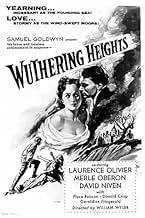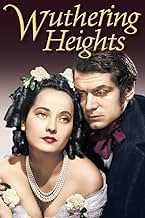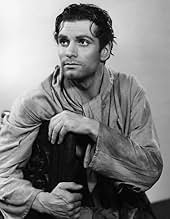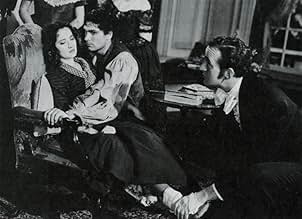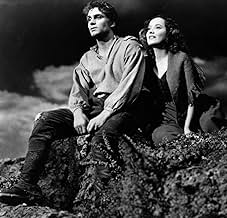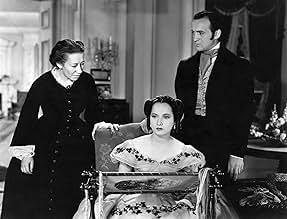IMDb रेटिंग
7.5/10
21 हज़ार
आपकी रेटिंग
अपनी भाषा में प्लॉट जोड़ेंA servant in the house of Wuthering Heights tells a traveler the unfortunate tale of lovers Cathy and Heathcliff.A servant in the house of Wuthering Heights tells a traveler the unfortunate tale of lovers Cathy and Heathcliff.A servant in the house of Wuthering Heights tells a traveler the unfortunate tale of lovers Cathy and Heathcliff.
- 1 ऑस्कर जीते
- 9 जीत और कुल 7 नामांकन
Sarita Wooton
- Cathy (as a child)
- (as Sarita Wooten)
Frank Benson
- Heathcliff Servant
- (बिना क्रेडिट के)
Romaine Callender
- Robert
- (बिना क्रेडिट के)
Richard Clucas
- Little Boy
- (बिना क्रेडिट के)
Vernon Downing
- Giles
- (बिना क्रेडिट के)
फ़ीचर्ड समीक्षाएं
One of the finest romantic films ever filmed, this 1939 Samuel Goldwyn production rates with many - including myself - as being the most beloved version of Emily Bronte's haunting novel. Although it stops at chapter seventeen and the ending is seen as a bit trite by some, it's a brilliantly enacted, finely mounted production with beautiful photography and authentic period detail set-wise. Merle Oberon is well-cast as the selfish, vain and rather shallow Cathy. What makes her character so intriguing and interesting is that no matter what happens to her materially, she has an undying love for the gypsy-blooded heathen named Heathcliff. Laurence Olivier, never a great success in films prior to this, gives a brutally honest account of everything Bronte's Heathcliff should be: proud, bold, vengeful & darkly brooding -a tortured soul in general. Wyler's guiding hand is patent throughout: it was Olivier himself who gave credit to the meticulous director in teaching him the particular ropes of screen acting: it shows! Lady-like Isabella is well-played by the Irish Geraldine Page, while Ellen, the long-suffering servant is played sympathetically by the fine character actress Flora Robson. David Niven, ideally cast as the milquetoasty Edgar Linton, actually had a clause in his contract which freed him from having to do crying scenes! A timeless masterpiece of the "haunting" love story genre, this was Goldwyn's personal favourite of all his films.
I have not read the Emily Bronte novel on which this film is based so obviously I cannot comment on the effectiveness of it as an adaptation (I understand that almost the entire second half of the book was excised). However, I thoroughly enjoyed the film. Oberon and especially Olivier, one of my favorites, are very convincing and moving as the doomed lovers Cathy and Heathcliff (according to my friend, Heathcliff is written as being much more likeable in the film than in the book). The supporting cast was also very good. Wuthering Heights just deals very poignantly with the effect that birth and status have on people's lives. Yet another winner from Wyler. My score 9/10.
Talk about a brooding outdoors, those moody moors may represent a sense of liberation for the lovers, but they're not exactly inviting. Besides, it rains all the time, so best to be in the house even if mansions represent the confining space of class and class privilege. That's the trouble. Cathy is 'to the manor born', as they say. Thus she's really torn between the wild outdoors and the comforts of ballrooms and servants.
Then there's the enigmatic Heathcliffe, a dark wild-souled type guy, perfectly at home in those bleak rolling hills. He was a street ragamuffin before Cathy's elderly father adopted him into the manor as a stable boy. But he and a young Cathy manage to bond despite the class difference, a bond that eventually blossoms into true love. But that true love only breaks to the surface in the wild outdoors where a common humanity replaces artificial social distinctions. If only Cathy could find the will to break free of the leisure class.
What a great visual experience, the b&w expertly coordinated with the settings. When the two lovers approach the rocky crag, there's almost a feeling of an outdoor altar calling to them amidst the brooding hills. It's such a perfect visual contrast to the high-key ballrooms and parlors of the Lintons. The Lintons, however, are not to be despised despite their airs and privileges. In fact, they are very real victims of Cathy's suppressed feelings and Heathcliffe's cold calculations. As it turns out, there is no spectral salvation for them. As a result, the love being portrayed here is a kind of mad love, one that brings tragedy to all concerned. Thus, there's a reason those moors brood in dark fashion, while the movie itself remains the best of the many makes and remakes.
Then there's the enigmatic Heathcliffe, a dark wild-souled type guy, perfectly at home in those bleak rolling hills. He was a street ragamuffin before Cathy's elderly father adopted him into the manor as a stable boy. But he and a young Cathy manage to bond despite the class difference, a bond that eventually blossoms into true love. But that true love only breaks to the surface in the wild outdoors where a common humanity replaces artificial social distinctions. If only Cathy could find the will to break free of the leisure class.
What a great visual experience, the b&w expertly coordinated with the settings. When the two lovers approach the rocky crag, there's almost a feeling of an outdoor altar calling to them amidst the brooding hills. It's such a perfect visual contrast to the high-key ballrooms and parlors of the Lintons. The Lintons, however, are not to be despised despite their airs and privileges. In fact, they are very real victims of Cathy's suppressed feelings and Heathcliffe's cold calculations. As it turns out, there is no spectral salvation for them. As a result, the love being portrayed here is a kind of mad love, one that brings tragedy to all concerned. Thus, there's a reason those moors brood in dark fashion, while the movie itself remains the best of the many makes and remakes.
I saw this film many years before I read the book, I know which I prefer - OK, maybe with rose-tinted spectacles on. The book by Emily Bronte is an undeniable classic as is this film version but imho this is a much better use of one hundred and five minutes of life. And though they keep trying, this will remain the best condensation of the story, Wuthering Lites c/o the original Fantasy Factory.
Waif brought into well off Yorkshire home, grows up to fall in violent love with the masters daughter and violent hate with the son, and eventually owns the estate but not the woman. Laurence Olivier and Merle Oberon are perfect as the manic birds of a feather Heathcliff and Cathy with David Niven as the elegant sidelined husband. Everyone is portrayed as faulty or unlikeable in some way, romance is seen as hopeless childishness leading at best to passionate petulance, at worst to death; love is as strange as people. It's relentlessly beautiful stuff, gloriously photographed by Gregg Toland with a glowing atmosphere and a most assured production than has not been possible to achieve again. The spirit of nonsensical romance has been lost in this more cynical age. Favourite bits: Miles Mander's melodramatics at the beginning resulting in Flora Robson's picture-long flashback; the windswept pair on the rocks; the pair gatecrashing the dance; Oberon's unravelling to Niven and the tear-jerking finale. Director William Wyler had a long and illustrious career, but to my mind he never bettered this effort.
Watch it and weep; not only at the film's content but for a cinematic era long dead and never coming back.
Waif brought into well off Yorkshire home, grows up to fall in violent love with the masters daughter and violent hate with the son, and eventually owns the estate but not the woman. Laurence Olivier and Merle Oberon are perfect as the manic birds of a feather Heathcliff and Cathy with David Niven as the elegant sidelined husband. Everyone is portrayed as faulty or unlikeable in some way, romance is seen as hopeless childishness leading at best to passionate petulance, at worst to death; love is as strange as people. It's relentlessly beautiful stuff, gloriously photographed by Gregg Toland with a glowing atmosphere and a most assured production than has not been possible to achieve again. The spirit of nonsensical romance has been lost in this more cynical age. Favourite bits: Miles Mander's melodramatics at the beginning resulting in Flora Robson's picture-long flashback; the windswept pair on the rocks; the pair gatecrashing the dance; Oberon's unravelling to Niven and the tear-jerking finale. Director William Wyler had a long and illustrious career, but to my mind he never bettered this effort.
Watch it and weep; not only at the film's content but for a cinematic era long dead and never coming back.
Great literature enriches the soul. The Brontes created great literature because they invented so much of what it means. They invented ways of observing the soul that hadn't already been mined by Shakespeare. If you want a great film that celebrates, explores, exploits Bronte, you can't escape the reality that you'd have to stretch film the same way Charlotte stretched perspective.
Didn't happen here. Olivier seemed good enough at what he knew (stage acting) but that isn't bendable to great experiences in film. Never was.
But you might want to watch this for another reason. The dialog and acting are ordinarily conceived. But the cinematography is extraordinary, from the very special Greg Toland. Greg DID stretch cinema in the way we mentioned. His greys have depth. When he photographs the heath, we feel the atmosphere as if the mist had emotion.
The interiors of the house are magnificent in design. And Toland's lighting and framing are so haunting.
This film is why Orson Welles wanted him on "Citizen Kane." You need to watch it to see where much of the disembodied ghost-observer comes from. With Toland, Cathy defines what we see and how.
But the actual story? Go read it instead.
Ted's Evaluation -- 2 of 3: Has some interesting elements.
Didn't happen here. Olivier seemed good enough at what he knew (stage acting) but that isn't bendable to great experiences in film. Never was.
But you might want to watch this for another reason. The dialog and acting are ordinarily conceived. But the cinematography is extraordinary, from the very special Greg Toland. Greg DID stretch cinema in the way we mentioned. His greys have depth. When he photographs the heath, we feel the atmosphere as if the mist had emotion.
The interiors of the house are magnificent in design. And Toland's lighting and framing are so haunting.
This film is why Orson Welles wanted him on "Citizen Kane." You need to watch it to see where much of the disembodied ghost-observer comes from. With Toland, Cathy defines what we see and how.
But the actual story? Go read it instead.
Ted's Evaluation -- 2 of 3: Has some interesting elements.
क्या आपको पता है
- ट्रिवियाLaurence Olivier found himself becoming increasingly annoyed with director William Wyler's exhausting style of filmmaking. After yet another take, he is said to have exclaimed, "For God's sake, I did it sitting down. I did it with a smile. I did it with a smirk. I did it scratching my ear. I did it with my back to the camera. How do you want me to do it?" Wyler's retort was, "I want it better." However, Olivier later said these multiple takes helped him learn to succeed as a movie actor.
- गूफ़Though the social situations, and even the soundtrack, are consistent with the novel's timeframe of 1770-1801, the Colonial/Napoleonic era, the costumes are an odd mix of mid-Victorian and American Civil War.
- भाव
Heathcliff: Catherine Earnshaw, may you not rest so long as I live on! I killed you. Haunt me, then! Haunt your murderer! I know that ghosts have wandered on the Earth. Be with me always. Take any form, drive me mad, only do not leave me in this dark alone where I cannot find you. I cannot live without my life! I cannot die without my soul.
- क्रेज़ी क्रेडिटOpening credits prologue: On the barren Yorkshire moors in England, a hundred years ago, stood a house as bleak and desolate as the wastes around it. Only a stranger lost in a storm would have dared to knock at the door of Wuthering Heights.
- इसके अलावा अन्य वर्जनThere is an Italian edition of this film on DVD, distributed by DNA Srl: "CIME TEMPESTOSE (1939) + ORGOGLIO E PREGIUDIZIO (1940)" (2 Films on a single DVD), re-edited with the contribution of film historian Riccardo Cusin. This version is also available for streaming on some platforms.
- कनेक्शनFeatured in AFI Life Achievement Award: A Tribute to William Wyler (1976)
- साउंडट्रैकPiano Sonata in A major, K.331: Rondo alla Turca
(1778) (uncredited)
Music by Wolfgang Amadeus Mozart
Played by Alice Ehlers on harpsichord
टॉप पसंद
रेटिंग देने के लिए साइन-इन करें और वैयक्तिकृत सुझावों के लिए वॉचलिस्ट करें
विवरण
- रिलीज़ की तारीख़
- कंट्री ऑफ़ ओरिजिन
- आधिकारिक साइट
- भाषा
- इस रूप में भी जाना जाता है
- Cumbres borrascosas
- फ़िल्माने की जगहें
- उत्पादन कंपनी
- IMDbPro पर और कंपनी क्रेडिट देखें
बॉक्स ऑफ़िस
- US और कनाडा में सकल
- $6,24,643
- US और कनाडा में पहले सप्ताह में कुल कमाई
- $15,493
- 9 अप्रैल 1989
- दुनिया भर में सकल
- $6,24,643
- चलने की अवधि1 घंटा 44 मिनट
- रंग
- पक्ष अनुपात
- 1.37 : 1
इस पेज में योगदान दें
किसी बदलाव का सुझाव दें या अनुपलब्ध कॉन्टेंट जोड़ें



